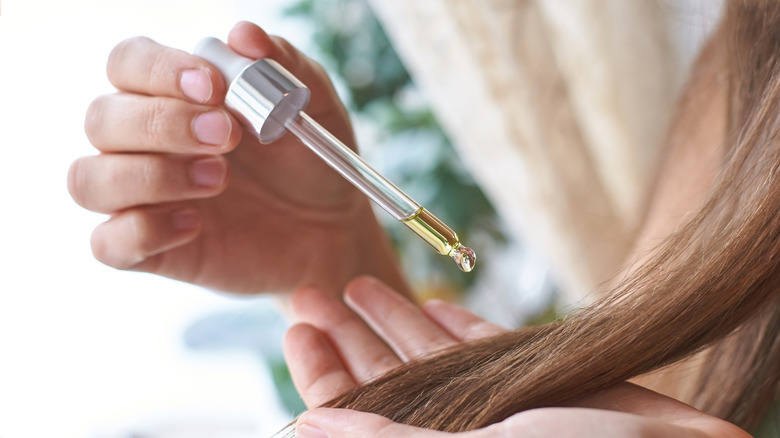Canola Oil: What Can It Do For Your Hair?
We may receive a commission on purchases made from links.
Argan oil and other hair oils get a lot of praise for their moisturizing effects. With regular use, these products can help repair damaged hair and lock in moisture, among other benefits. As celebrity hairstylist Mark Townsend told Forbes, "Every woman would benefit from using oils even just once a week." Chances are, your hair needs some extra oil if it's dry, frizzy, or brittle.
Some cooking oils can be good for your hair, too. A great choice is olive oil, which may benefit those with thicker locks. You could also use canola oil, a natural product rich in mono- and polyunsaturated fatty acids, vitamin E, and phytonutrients. Clinical evidence supports its anti-inflammatory, antioxidant, anti-cancer, and cardioprotective effects, reports the journal Nutrition Reviews. Moreover, it can moisturize and repair damaged hair when applied topically, suggests a 2018 article published in Research Journal.
This oil comes from the seeds of the canola plant, a member of the same family as cabbage, broccoli, and kale. What makes it stand out is its content of alpha-linolenic acid (ALA), oleic acid, and other good fats. Plus, it's high in antioxidants and has very little saturated fat, notes Harvard T.H. Chan School of Public Health. Most canola oil is refined, but that shouldn't be an issue if you consume it along with other oils or use it solely for hair care.
How does canola oil benefit your hair?
Health experts worldwide are raving about the benefits of using hair oil, a practice that can help you get longer and thicker hair. For example, coconut oil may reduce protein loss from the hair, whereas sunflower oil can help prevent hair damage, according to a 2015 review featured in the International Journal of Trichology. Other mineral and vegetable oils can increase moisture, strengthen the hair, or protect against split ends.
Canola oil can be just as beneficial as argan or coconut oil, depending on your hair type. Certified trichologist Shab Reslan told Byrdie that linoleic acid, a healthy fat in canola oil, nourishes the scalp and promotes hair growth. Vitamin E, another key nutrient, reduces hair loss and protects your locks from oxidative stress. As mentioned earlier, canola oil also has anti-inflammatory effects and may therefore help prevent and minimize dandruff, says Gretchen Friese, a trichologist interviewed by the publication.
This common ingredient is around 63% monounsaturated fat and 9% to 11% polyunsaturated fat, as reported by Harvard T.H. Chan School of Public Health. Due to its high lipid content, it can tame frizzy hair and add shine when applied topically. Additionally, vitamin E — one of the most abundant antioxidants in this oil — protects your hair from ultraviolet radiation, pollution, and heat damage, according to beauty expert Nina Wawryszuk (via Vegamour). But despite these potential benefits, canola oil may not be suitable for everyone and should only be used in small amounts.
How to apply canola oil to your hair
Depending on your needs, you may use this oil alone or combine it with other oils. For example, trichologist Gretchen Friese recommends massaging your scalp with a mixture of canola, lemongrass, and rosemary oil before applying shampoo. This option works best for those whose main goal is hair growth, she told Byrdie. Alternatively, you can mix it with coconut oil and then apply it to your hair and scalp for increased moisture. Wait 30 minutes before washing your hair, says Friese.
Another option is to heat the oil and massage it into your scalp for at least 10 minutes. Cover your hair for another 30 minutes and then wash it with shampoo, suggests StyleCraze. Last but not least, you can use it as a leave-in conditioner. "To help combat dry hair issues, canola oil can be mixed with warm water and sprayed into the hair. Leave it in like a leave-in conditioner to provide extra moisture and protect the hair from damage," recommends Friese.
The experts interviewed by Byrdie say canola oil is suitable for all hair types, but it shouldn't be used by people with sensitive scalps. Also, make sure you test it on your wrist or skin to rule out an allergic reaction. Apart from that, decide whether you want to use pure canola oil or an oil blend, such as Ouai Hair Oil. The latter may be a better option for those with dry, damaged hair or other specific needs.


